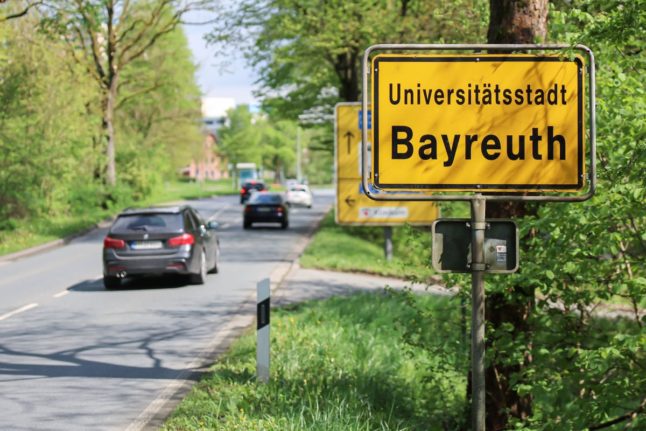The pair, identified only as Dieter S. and Alexander J., were arrested in Bayreuth in the southeastern state of Bavaria on Wednesday, federal prosecutors said in a statement.
The main accused, Dieter S., is alleged to have scouted potential targets for attacks, “including facilities of the US armed forces” stationed in Germany.
Russia’s ambassador to Berlin was summoned by the foreign ministry following the arrests.
Germany would not “allow Putin to bring his terror to Germany”, Foreign Minister Annalena Baerbock subsequently said on X.
But Russian officials rejected the accusations.
“No evidence was presented to prove the detainees’ plans or their possible connection to representatives of Russian structures,” the Russian embassy in Berlin said in a post on X.
Police have searched both men’s homes and places of work.
They are suspected of “having been active for a foreign intelligence service” in what prosecutors described as a “particularly serious case” of espionage.
Interior Minister Nancy Faeser likewise called the allegations “a particularly serious case of suspected agent activity for (Vladimir) Putin’s criminal regime”.
“We will continue to thwart such threat plans,” she said, reiterating Germany’s steadfast support for Ukraine.
How US army facilities were targeted
“We can never accept that espionage activities in Germany take place,” Chancellor Olaf Scholz said at a meeting of EU leaders in Brussels.
According to prosecutors, Dieter S. had been exchanging information with a person linked to Russian intelligence services since October 2023, discussing possible acts of sabotage.
“The actions were intended, in particular, to undermine the military support provided from Germany to Ukraine against the Russian aggression,” prosecutors said.
The accused allegedly expressed readiness to “commit explosive and arson attacks mainly on military infrastructure and industrial sites in Germany”.
Dieter S. collected information about potential targets, “including facilities of the US armed forces”.
Fellow accused Alexander J. began assisting him from March 2024, they added.
Dieter S. scouted potential targets by taking photos and videos of military transport and equipment. He then allegedly shared the information with his contact person.
Der Spiegel magazine reported that the military facilities spied on included the US army base in Grafenwoehr in Bavaria.
“Among other things, there is an important military training area there where the US army trains Ukrainian soldiers, for example on Abrams battle tanks,” Der Spiegel wrote.
Dieter S. faces an additional charge of belonging to a “foreign terrorist organisation”. Prosecutors said they suspect he was a fighter in an armed unit of eastern Ukraine’s self-proclaimed pro-Russian “People’s Republic of Donetsk” in 2014-2016.
Espionage showdown
Germany is Ukraine’s second-largest supplier of military aid, and news of the spy arrests came as Vice Chancellor Robert Habeck was on a visit to Kyiv.
“We will continue to provide Ukraine with massive support and will not allow ourselves to be intimidated,” Interior Minister Faeser said.
Germany has been shaken by several cases of alleged spying for Russia since the invasion of Ukraine in 2022, amid suggestions that some German officials have been too sympathetic with Moscow in the past.
A former German intelligence officer is on trial in Berlin, accused of handing information to Moscow that showed Germany had access to details of Russian mercenary operations in Ukraine. He denies the charges.
In November 2022, a German man was handed a suspended sentence for passing information to Russian intelligence while serving as a German army reserve officer.
“We know that the Russian power apparatus is also focusing on our country — we must respond to this threat with resistance and determination,” Justice Minister Marco Buschmann said Thursday.
READ ALSO: Two Germans charged with treason in Russia spying case
Additionally, a man suspected of aiding a plot by Russian intelligence services to assassinate Ukrainian President Volodymyr Zelensky has been arrested in Poland, on Thursday, according to Polish and Ukrainian prosecutors.
It said the suspect had stated he was “ready to act on behalf of the military intelligence services of the Russian Federation and established contact with Russian citizens directly involved in the war in Ukraine”.
Russian authorities for their part have levelled treason charges against dozens of people accused of aiding Kyiv and the West since the invasion.
A Russian court sentenced a resident of Siberia’s Omsk region to 12 years in jail earlier this month for trying to pass secrets to the German government in exchange for help moving there.




 Please whitelist us to continue reading.
Please whitelist us to continue reading.
Member comments